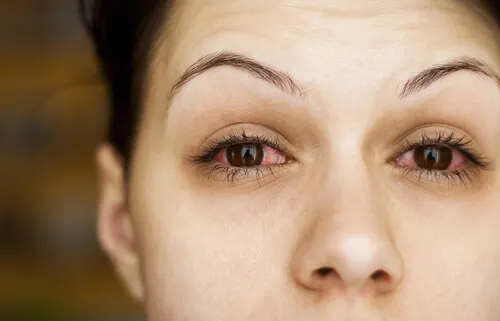How to Protect Your Eyes from the Cold


Reviewed and approved by the doctor Leonardo Biolatto
Most people only worry about their eyes in summer, when the sun’s rays are so intense that they can barely see clearly. But this shouldn’t be the only time of the year to worry about our eyesight. We should also protect our eyes from the cold in winter.
We’re wrong to think that during autumn or winter our eyes don’t suffer. In fact, taking care of your eyes during this time can become even more important. Cold, wind, and drier air are factors that trigger dry eyes.
The situation gets even worse if you live in snowy areas or decide to travel to the mountains. Snow reflects very intensely the ultraviolet rays of sunlight, which can also damage our eyesight.
It’s necessary to take into account all these aspects, as protecting your eyes can help you avoid many future vision problems. Therefore, in this article, we’re going to explain a series of tips to protect them from the ravages of the cold.
How can you protect your eyes from the cold?
As we have already mentioned, many aspects of winter can have a negative effect on our eyes. Although there are fewer daylight hours and the intensity of the sun’s rays is lower, it’s also the perfect time to go to snowy areas.
Snow reflects ultraviolet rays, which can damage our eyesight. In addition, the cold air is usually drier and more aggressive to our skin and eyes. However, staying indoors isn’t the ultimate solution, nor is it the recommended way of life. Indoors, smoke from fireplaces is also irritating, as is the dry atmosphere created by heating.
It is, therefore, important to be aware of all these factors and to start taking care of your eyes from the cold. First of all, we mustn’t forget about sunglasses or leave them abandoned until summer. Even less so if we go to the snow or to high altitude areas.
This season is also often characterized by intense hours of study or work. Nowadays, most people spend many hours of the day in front of a screen, whether it’s a computer or television. In these cases, it’s recommended to take breaks every hour and look away. You can even do some muscle relaxation exercises to correct your posture as well. If you can, the ideal thing is to spend that break outdoors, with natural light.

You may be interested in: What Are the Causes of Watery Eyes?
Taking care of your eyes from dry air
If you live or work in places where heating is used, it’s important to insist that the temperature is kept to between 21 and 23 degrees C (70 to 73 F). The use of heaters tends to make the environment dry, so it’s recommended to use humidifiers in the rooms.
When it’s windy you should also use sunglasses. This will protect your eyes from dryness and airborne particles. In addition, try to blink more frequently, as this will improve tear production and eye moisture.
If these measures aren’t enough, you can even use artificial tears on your eyes. As with skin care, it’s recommended to drink plenty of water and include fruits and vegetables in your diet to maintain good body hydration.
As we spend more time indoors in the winter, we use more screens, which generates eye strain
You may also like: 10 Foods to Help You Maintain Healthy Eyesight
Other tips
When you have itchy eyes, try not to rub or scratch them hard. It’s probably a consequence of dryness, and to combat this sensation it’s better to use tears or eye drops. Also, try to clean your eyes frequently and remove makeup properly.
However, if you have any eye discomfort or problem, it’s best to consult a doctor or eye specialist. They’ll be able to verify that it isn’t a serious pathology. On the other hand, they’ll recommend the most effective measures to alleviate the situation.
All cited sources were thoroughly reviewed by our team to ensure their quality, reliability, currency, and validity. The bibliography of this article was considered reliable and of academic or scientific accuracy.
- El frío afecta en el cuidado de los ojos | Optica2000 Blog. (n.d.). Retrieved January 21, 2020, from https://www.optica2000.com/blog/2019/12/09/el-frio-afecta-en-el-cuidado-de-los-ojos/
- Cómo cuidar tus ojos de la nieve y el frío – El Blog de Medical Óptica Audición. (n.d.). Retrieved January 21, 2020, from https://medicaloptica.es/blog/cuidar-tus-ojos-del-frio-la-nieve/
- Consejos para proteger tus ojos del frío en invierno. (n.d.). Retrieved January 21, 2020, from https://www.masvision.es/blog/mas-vision/consejos-para-proteger-tus-ojos-del-frio-en-invierno/
- ¿Cómo cuidar la vista en invierno? | Blog de Clínica Baviera. (n.d.). Retrieved January 21, 2020, from https://www.clinicabaviera.com/blog/cuidar-la-vista-invierno/
This text is provided for informational purposes only and does not replace consultation with a professional. If in doubt, consult your specialist.








